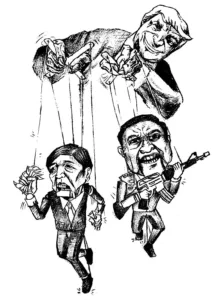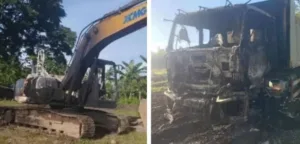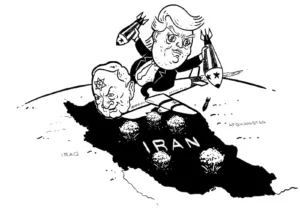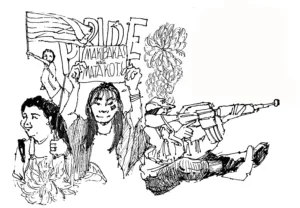LUIS G. JALANDONI
NDFP Chief International Representative
The current situation in the Philippines is characterized by intense repression by the state forces under the Arroyo regime and the intensified resistance of the Filipino people.
The conditions under the Arroyo regime are similar to martial law conditions under the Marcos dictatorship. One clear indication of this repression is the illegal arrest and detention of veteran trade union leader and congressman, Crispin Beltran, and the charge of rebellion against him and five other progressive congresspersons.
LUIS G. JALANDONI
NDFP Chief International Representative
Speech delivered in public meeting
organized by the Marxist-Leninist Party of Germany
(Marxistisch-Leninistische Partei Deutschlands, MLPD)
Gelsenkirchen, Germany
The current situation in the Philippines is characterized by intense repression by the state forces under the Arroyo regime and the intensified resistance of the Filipino people.
The conditions under the Arroyo regime are similar to martial law conditions under the Marcos dictatorship. One clear indication of this repression is the illegal arrest and detention of veteran trade union leader and congressman, Crispin Beltran, and the charge of rebellion against him and five other progressive congresspersons.
On 25 February 2006, a day after the declaration of a state of national emergency by President Arroyo, Crispin Beltran, former chairman of KMU, presently Congressman for Anakpawis (Toiling Masses) party list, was arrested. He continues to be detained despite a court order for his release. Five other congresspersons: Liza Maza of Gabriela Women’s Party, Satur Ocampo, Teddy Casino and Joel Virador of Bayan Muna (The People First) party and Rafael Mariano of Anakpawis are compelled to stay in the parliament building since 27 February, because the police are ready to arrest them the moment they step out of the building.
Among those also being hunted and charged with rebellion are six other leaders of left organizations. Twenty military officers, including a general, are facing a court martial, while 39 other officers and 37 enlisted men are facing disciplinary action. An anti-communist witchhunt, similar to that of US Senator McCarthy in the 1950’s, is rabidly being carried out.
Killings and disappearances similar to US Operation Phoenix in Vietnam
Extrajudicial killings by motorcycle-riding assassins are rampant and escalating. From Jan. 1 this year until 22 March, 43 have been killed, 10 disappeared. That is 4 killed and 1 disappeared every week. In 2005, 179 killed, 46 disappearances, and 52 victims of frustrated killing. There were 99,011 victims of human rights violations from 1 January to 30 November 2005, as documented by KARAPATAN (Alliance for the Advancement of People’s Rights). That means 12 victims every hour! Those attacked are leaders of progressive party lists (35 of Anakpawis and 30 of Bayan Muna in 2005), worker and peasant leaders, youth, journalists, human rights workers, church persons, lawyers, and women.
While the killings have been taking place mostly in the provinces, latest reports indicate that the death squads of the military are about to start the killing of activists in Metro Manila.
To cow the media, the regime has clamped down on media critical of it, threatening closure of publications and television and radio stations and charging them with inciting to sedition. In fact, a progressive newspaper was closed down and two radio programs taken off the air.
State repression also reaches abroad. There is the terrorist listing by the US, Canada, and the European Union of Prof. Jose Maria Sison, the Chief Political Consultant of the National Democratic Front of the Philippines (NDFP) and the denial of political asylum to Jose Luneta by Germany. In the US, Filipino activists are subjected to harassment, intimidation and surveillance by the US Homeland Security, because they protest against the Arroyo regime, condemn the rape of a Filipina by US marines, and oppose US military intervention in the Philippines.
The people's resistance is intensifying
The resistance is intensifying. Despite the prohibition and violent dispersal of mass actions, protests and demonstrations, these continue. Issues are raised against Arroyo for fraud in the last elections, corruption involving the presidential family, and anti-people economic policies causing widespread hunger and unemployment.
Unemployment stands at 50%. More than 80 % of the population live below the poverty line. Arroyo is also accused of puppetry to US imperialism. There is an increasing number of US troops in the Philippines; there are 5,500 at the moment. Arroyo is sharply criticized for her moves to change the constitution to grant 100% foreign ownership of land, banks, utilities, services and allow the presence of foreign troops, bases and nuclear weapons.
Demonstrations against the Arroyo regime continue. On 24 February, about 40,000 demonstrated in two places in Metro Manila. Protest actions continue in different parts of the country. For example, hundreds of lawyers of the Concerned Lawyers for Civil Liberties (CLCL) and other lawyers’ organizations marched on 7 March against Proclamation 1071 which declared the state of national emergency. Some 20,000 demonstrated in Bacolod City calling on Arroyo to resign. Big and small mass actions occur regularly in Manila and other cities.
A broad united front is developing against the Arroyo regime
A broad united front against the Arroyo regime is developing. This consists of the left forces in the legal democratic movement, the anti-Arroyo military and the anti-Arroyo opposition parties.
The Arroyo regime is split. Ten cabinet members abandoned the regime and called for Arroyo’s resignation in July 2005. The Senate is in the opposition. The military is divided into five factions in three groupings: 1) pro-Arroyo and pro-US high command, 2) anti-Arroyo pro- US officers, and 3) anti-Arroyo, anti-US officers and men, a considerable number of whom are open to truce and cooperation with the Left, including the New People’s Army (NPA).
Revolutionary work in the countryside
In the countryside, where ¾ of the population are found, the revolutionary movement is intensifying its 37 year-old people’s war. In more than 120 guerrilla fronts, covering about 9,000 villages in about 800 municipalities in 70 out of 79 provinces, the NPA is carrying out numerous tactical offensives against the Arroyo’s armed forces: military and police forces. In the last quarter of 2005, the NPA carried out about 200 tactical offensives of varying size.
The tactical offensives of the NPA are successful mainly because of the deep support of the people. On March 19-20, within two days, the NPA garnered 15 firearms without firing a shot. In early March this year, nine political prisoners were freed from a provincial jail in Batangas, south of Manila, again without firing a single shot.
Right now, the people’s war carried out by the NPA under the leadership of the Communist Party of the Philippines is in the process of developing the middle stage of the strategic defensive, prior to strategic stalemate and strategic offensive.
The many years of countryside work have resulted in building the mass organizations of peasants, workers, women, youth, children, and cultural groups. Organs of political power have been established. There are revolutionary barrio committees, or embryos of the people’s democratic government. There are subcommittees for organization, education, land reform, health, settling of disputes, and self-defense.
To respond to the people’s aspirations and demands, and thereby to achieve concrete improvement in the conditions of the masses, campaigns are carried out. The principal campaign is land reform. At present, the minimum program of revolutionary land reform is being implemented, namely, rent reduction, reduction or elimination of usury, raising of farmworkers’ wages, simple cooperatives, and sideline occupations for added income. The maximum program of free distribution of land to the peasantry will be implemented later.
The agrarian, health and other campaigns, the mass base building, and the tactical offensives of the NPA lead to steady growth of the revolutionary movement in the countryside.
The broad united front and revolutionary armed struggle strengthen each other
The legal work of the broad united front draws away the regime’s military units from the countryside. These units are brought to Manila in order to protect the Arroyo regime. The broad united front also increases the splits within the military. These help the revolutionary armed struggle.
The armed struggle weakens the Arroyo regime and helps the oust Arroyo campaign of the legal broad united front. Furthermore, the armed struggle inspires the legal democratic movement and broad united front.
The armed struggle is now directed at pro-Arroyo military and police forces. The NPA is offering alliance, truce and cooperation with anti-Arroyo military and police. Military and police troops of the Arroyo regime who announce or indicate, even through the use of red armbands, that they are against the Arroyo regime, are not targeted by the NPA.
The Arroyo regime is holding on to power with the help of the US, the majority of the Church hierarchy, the high command of the military and police and some big business groups. With such forces behind it, the regime pursues its reign of terror through intense repression, oppression and exploitation. Under these conditions, the Arroyo regime has killed the peace negotiations with the NDFP, putting all those involved in the peace talks on its wanted list, and charged with rebellion.
Filipino people's resistance generates increasing international support
There is increasing international support for the Filipino people’s struggle. Solidarity actions for the Filipino people are being carried out in the US, Canada, Greece, Turkey Belgium, the Netherlands, Switzerland, Germany, Hong Kong, Australia, New Zealand, and many other countries. There is a big outpouring of support for the parliamentarians under siege and Congressman Crispin Beltran. Dutch, Norwegian and Belgian parliamentarians and officials have raised questions on the issues of human rights violations and press freedom in the Philippines. Prime Minister Helen Clarke of New Zealand brought up these issues with Arroyo.
The National Council of Churches of Japan has called for the canceling of official development aid (ODA) to the Arroyo regime. Support groups and Defend committees extend significant assistance to the legal cases of Prof. Sison in the European courts in Luxembourg and Strasbourg and for the asylum application of Jose Luneta in Germany.
The just struggle of the Filipino people enjoys abundant moral and political support from the people all over the world. We will further exert efforts to bring about a new and higher level of international support, just as we deem it our duty to make our own contribution to the global struggle of the people against imperialism and reaction.
We are firmly convinced: victory belongs to the people in the end!











